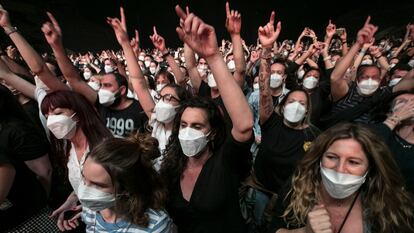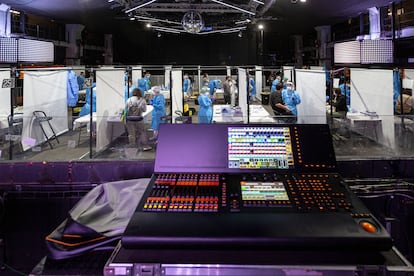Barcelona concert for 5,000 people was not a coronavirus superspreading event, study finds
According to researchers, only six positive cases were detected after the Love of Lesbian show in March

Researchers have concluded that a rock concert for 5,000 people in Barcelona was not a superspreading event. The concert featuring the band Love of Lesbian took place at the Palau Sant Jordi sporting arena on March 27. There was no social distancing at the event, but face masks had to be worn. In order to attend, the concert-goers had to either take an antigen test at the site or present the negative results of a test done in the previous eight hours.
The concert was part of a pilot study conducted by the research team at Germans Trias i Pujol Hospital, which presented their findings on Tuesday. Of the 5,000 attendees, only six coronavirus cases were detected, according to Josep Maria Llibre, a member of the hospital’s department against infectious diseases. Upon further review of these contagions, it was determined that four of the cases had not been caught at the concert.

“Analyzing the data available, the possibility that these people had contracted the virus at the event is minimal,” said Llibre.
The researchers indicated that the coronavirus incidence rate among the general population of Barcelona was nearly double that of the concert-goers. As of April 14, the 14-day cumulative number of cases per 100,000 inhabitants was 130.7 in the case of the attendees, and 259.9 in the case of the same age group in the wider community.
But there are still many questions yet to be resolved, said researchers Buenaventura Clotet and Boris Rebollo, who also took part in the pilot test. There are doubts, for example, about whether to include people who had been vaccinated in the study, given that, as Clotet explained, “a vaccinated person, even though they may have a low viral load, can still spread [the coronavirus].”

There are also questions about how such an event could be carried out in smaller venues, which do not have the resources to carry out on-site antigen tests. Jordi Herreruela, the director of the Cruïlla music festival – which is expected to bring together 25,000 people a day at the three-day event in summer – said that “what’s most difficult is correctly verifying the test results and being able to give a valid result to each person studied.” He explained that while the pilot at the Palau Sant Jordi showed that such a feat was possible, it comes “with a very high economic cost.”
Llibre argued that it was up to health authorities to introduce protocols for these types of events that clearly state “where attendees need to be tested, in what period and with what limits.”
With respect to the new, more contagious variants of the coronavirus, Clotet said that the antigen test “work for any virus, although in each case the speed of transmission is different.”
English version by Melissa Kitson.
Tu suscripción se está usando en otro dispositivo
¿Quieres añadir otro usuario a tu suscripción?
Si continúas leyendo en este dispositivo, no se podrá leer en el otro.
FlechaTu suscripción se está usando en otro dispositivo y solo puedes acceder a EL PAÍS desde un dispositivo a la vez.
Si quieres compartir tu cuenta, cambia tu suscripción a la modalidad Premium, así podrás añadir otro usuario. Cada uno accederá con su propia cuenta de email, lo que os permitirá personalizar vuestra experiencia en EL PAÍS.
¿Tienes una suscripción de empresa? Accede aquí para contratar más cuentas.
En el caso de no saber quién está usando tu cuenta, te recomendamos cambiar tu contraseña aquí.
Si decides continuar compartiendo tu cuenta, este mensaje se mostrará en tu dispositivo y en el de la otra persona que está usando tu cuenta de forma indefinida, afectando a tu experiencia de lectura. Puedes consultar aquí los términos y condiciones de la suscripción digital.








































